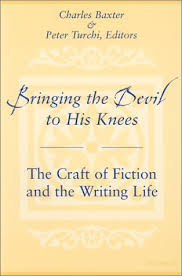 Meditations on the Craft of Writing
Meditations on the Craft of Writing
Baxter, Charles, & Turchi, Peter (Eds.) (2001). Bringing the Devil to his Knees: The Craft of Fiction and the Writing Life. Ann Arbor, MI: University of Michigan Press, 258 pp.
This collection of 19 essays is not really a “how-to” writing book, but an exploration of various perplexities and problems that arise in writing fiction. The title comes from a 1888 quotation from Chekhov,
“I am displeased and bored with everything now being written, while everything in my head interests, moves, and excites, me – whence I draw the conclusion that no one is doing what is needed, and I alone know the secret of how it should be done. In all likelihood everyone who writes thinks that. In fact, the devil himself will be brought to his knees by these questions.”
The usefulness of the essays is variable, as you would expect. Richard Russo opens with a strong article in defense of omniscient narration, which has fallen out of favor. Everyone today seems to prefer third-close or third-limited, but he argues that third-omniscient gives most creative freedom to a mature writer who has something to say. If it sounds a little old-fashioned to the modern ear, so be it. It was a persuasive argument and will affect how I think about my next project.
Other essays are exercises in frustration. Three of them concern the question of voice. Everybody wants it. Editors call for it. Authors struggle to find it. What is it? The findings from three articles? Nobody knows what it is or how you get it.
Debra Spark has a halfway useful essay on beginnings and endings. It’s only half useful because the section on beginnings amounts to little more than a list of great opening lines and paragraphs, from which no generalizations are drawn to further the effort of writing one’s own openings. On endings however, she is very informative and helpful.
A way off-base article by Karen Brennan tries to argue that memory is an epiphenomenon of neurology, a thesis I just don’t buy, on philosophical and empirical grounds. Her main point, that good writing needs a balance of wild free-association and careful narrative control is valid, but has nothing to do with neurology.
On the other hand, I did enjoy an essay by Robert Boswell, who drew a parallel between the theory of evolution in biology, and the evolution of symbol, device, and metaphor in fiction. Let those evolve organically from the writing, he argues, let them be discovered. If you plant them, it won’t work.
Perhaps one of the most practical essays was a humorous one by Kevin McIlvoy, a former editor, who writes a rejection letter to Stephen Crane for The Red Badge of Courage, criticizing it (fairly) on many points. Then he writes an acceptance letter for the same submission, highlighting (fairly) the book’s many literary virtues. The lesson for me, as I head toward a writers’ conference: treat every story as if it were a masterpiece submitted by a master, and keep your ego in check.
These are just a few notes on a few essays, in a book filled with thoughtful observations and questions about the craft of writing.
